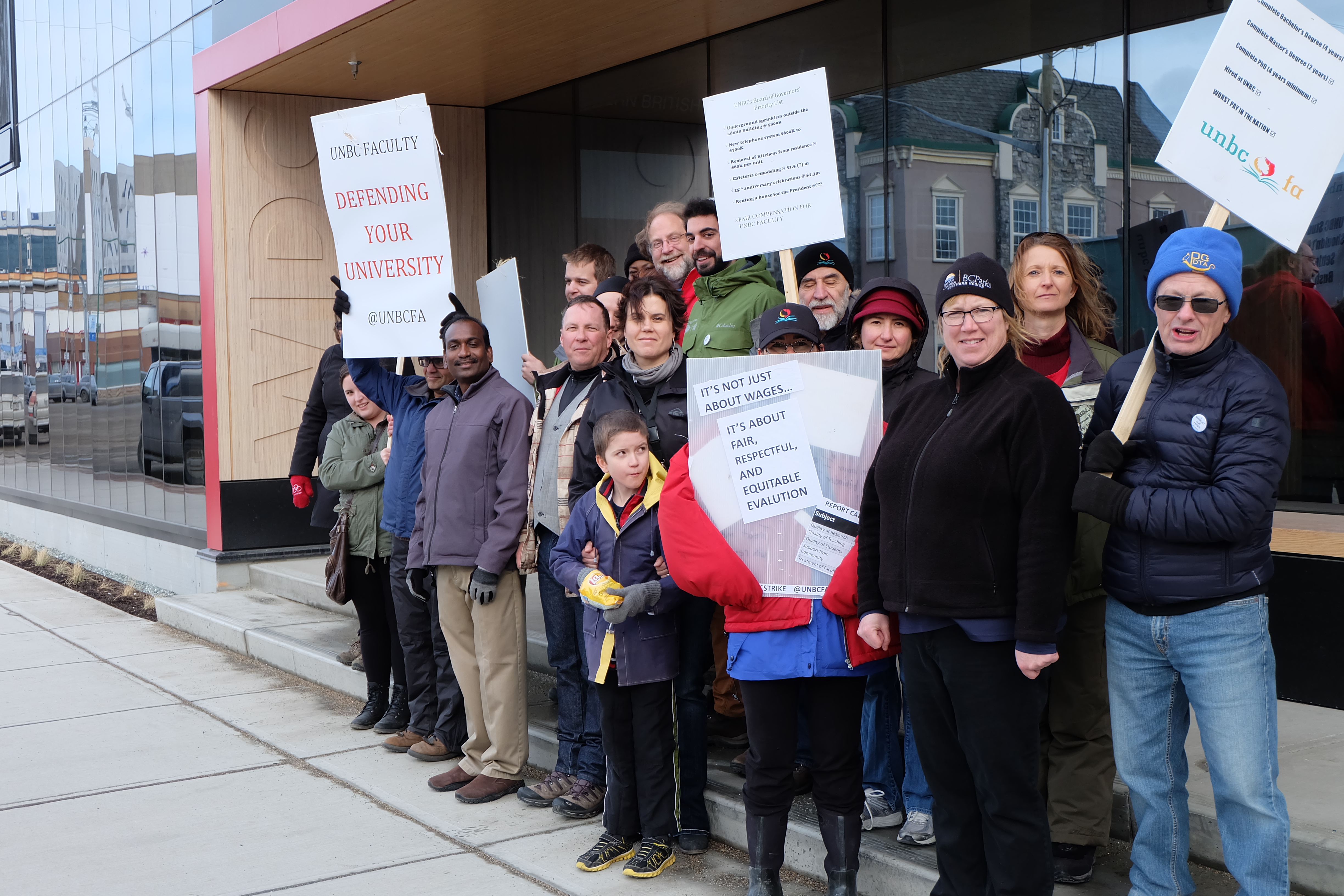Negotiations have resumed today between the University of Northern British Columbia Faculty Association and the university’s administration. However, classes remain cancelled at the school as faculty fight to achieve a first contract with the University.
“This is actually the first response we’ve had to our tabled proposal of February 26, so it’s been a while coming,” said UNBC’s Faculty Association President Jacqueline Holler.
Just over 230 professors, full- and part-time instructors, senior lab instructors and academic librarian have been on strike at the Northern B.C. University in Prince George since March 5.
The UNBC Faculty Association (FA) has been fighting for a first contract for its members since April 2014, arguing that UNBC faculty make significantly less than staff at comparable Canadian universities.
“In most university salary systems there’s some relationship between your academic rank, the years that you spent in that rank, and the rate that you’re compensated at,” Holler explained. But at UNBC, seniority does not factor into wages at all, so a professor who has worked three years could be making the same amount as a professor who has worked 15 years.
Unlike other professionals, academics tend to start their careers with relatively low salaries but the rate of compensation increases more rapidly than it does in other professions, in part to reward continued academic achievement. But that’s not the way it works at UNBC.
“That’s the first problem,” Holler explained, “The second problem is that when you look at our salary systems compared with comparable salary systems across the country, our salaries are just terribly low.” Holler explained that faculty at UNBC are sometimes making 30,000 to 40,000 less than their peers at other universities.
Until last year, the Faculty Association was not a certified union, though they have been fighting for fairer wages since 2012, when the FA requested the intervention of well-known independent arbitrator, Vince Ready, who was also the arbitrator appointed in the 17-month long Ikea Richmond strike.
Ready’s report, released in February 2014, revealed that the university was by no means in dire financial straights, having run a general operating funding surplus for the past several years. More than that, Ready noted that the University’s funding for labour costs have decreased in the last five years, while salary savings have increased.
“Such characteristics do not, by any measure, create the impression of a dire financial circumstance,” wrote Ready, “or of a situation preventing the institution from reordering its spending priorities.”
Faced with recalcitrant administration, the university’s faculty voted overwhelmingly to certify as a union in April 2014 but have yet to win their first contract.
Unlike many Faculty Associations, the UNBC FA includes both tenure track faculty and sessional, part-time and contract faculty.
“I’m actually really proud of that aspect of our association,” said Holler. “I think our story is actually a story of how it should work — which is that you have one association that takes it on to represent everybody, so the interests of one group can’t be played off against another. And we’ve avoided that.”
Unlike at other universities where contract faculty are often given short shrift, Holler explained that the Faculty Association has won competitive salary rates and job security for contract faculty. It’s the tenured staff who remain out in the cold.
“I believe this really links in to the growing phenomenon of corporatization of the university and the decentering of the academic mission,” said Holler, “We have a university that on tone hand has managed to spend millions of dollars on renovations. There’s money for some things, there’s money for rebranding, but the academic missions that we are part of seems to be increasingly unimportant relative to those objectives.”
In May 2014 the administration tabled proposals that the union says would have taken the employment agreement even further from sector norms. By January 2015, members of the Faculty Association still felt that their priorities were not being heard, and members voted 85 per cent in favour of giving their union a strike mandate.
Rather than asking for any across-the-board salary increases, the union has proposed a complete re-mapping of the UNBC salary structure, under which each member’s salary would be determined by their years of service in rank. Under this system, some members would see no increase at all. Others would see their salaries raised closer to the market rate.
According to the union, the bargaining teams had met for over 220 hours, spread over 45 separate sessions before the strike. With no consensus in sight, university faculty walked off the job on March 5. CUPE support staff at the university have also withdrawn their labour.
Negotiations broke down on Friday March 6, after the employer’s bargaining committee told the union that they would not be tabling a response to the union’s latest proposal. Both parties have since returned to the table.
“When you’re in the midst of something you don’t want to dissect it too much and dig through its entrails,” said Holler, “but what I would say is: we’ve got a long way to go.”
Ella Bedard is rabble.ca’s labour intern and an associate editor at GUTS Canadian Feminist Magazine. She has written about labour issues for Dominion.ca and the Halifax Media Co-op and is the co-producer of the radio documentary The Amelie: Canadian Refugee Policy and the Story of the 1987 Boat People.



